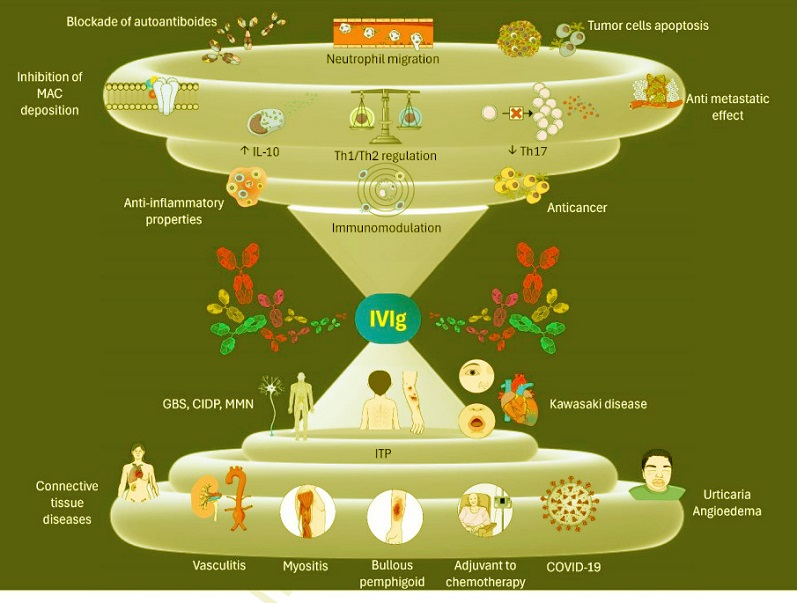Nikhil Prasad Fact checked by:Thailand Medical News Team Nov 25, 2024 1 year, 1 month, 1 day, 7 hours, 9 minutes ago
Medical News: A New Frontier in Autoimmune Care
A team of international researchers has unveiled promising insights into the use of Intravenous Immunoglobulin (IVIg) therapy for treating autoimmune diseases. This collaborative study involved experts from Università Politecnica delle Marche-Italy, University of Messina-Italy, and the Zabludowicz Center for Autoimmune Diseases in Israel. Their findings reveal the vast potential of IVIg in managing diseases ranging from Guillain-Barré syndrome to long COVID-19.
 Mechanisms of the immunomodulatory action of IVIg in autoimmune diseases
Mechanisms of the immunomodulatory action of IVIg in autoimmune diseases
IVIg, a therapeutic preparation derived from human blood plasma, is already widely used to treat immunodeficiency disorders. Now, its immunomodulatory properties are opening new doors for addressing complex autoimmune conditions where conventional treatments often fall short. This
Medical News report delves into the mechanisms of IVIg, its diverse applications, and why it holds such promise for the future of medicine.
What is IVIg and How Does It Work?
Intravenous Immunoglobulin (IVIg) is made from purified immunoglobulin G (IgG) antibodies collected from healthy donors. Antibodies are proteins essential for fighting infections and maintaining immune balance. IVIg therapy works not only as a replacement for those with deficient immune systems but also as a powerful tool to regulate overactive immune responses.
Key mechanisms of IVIg include:
-Neutralization of Harmful Antibodies: In autoimmune diseases, the immune system mistakenly targets the body’s tissues. IVIg binds to these harmful antibodies, rendering them inactive.
-Anti-inflammatory Effects: IVIg reduces inflammation by blocking immune receptors that amplify harmful responses and by modulating cytokine levels, the chemical messengers of the immune system.
-Promoting Regulatory Immune Cells: IVIg encourages the production of regulatory T-cells, which act as the immune system's peacekeepers, preventing it from attacking healthy tissues.
These properties make IVIg an attractive option for diseases that are challenging to treat with standard therapies.
Key Findings of the Study
The study conducted an extensive review of the medical literature, focusing on IVIg’s applications in treating autoimmune, neurological, hematological, and dermatological diseases. Here’s a closer look at some of the conditions where IVIg has proven beneficial:
Neurological Disorders
Guillain-Barré Syndrome (GBS): A life-threatening condition where the immune system attacks nerves, causing weakness and paralysis. IVIg helps halt the
attack on nerves and speeds recovery.
-Chronic Inflammatory Demyelinating Polyneuropathy (CIDP): IVIg is a first-line treatment for this debilitating condition, significantly improving mobility and quality of life for many patients.
-Myasthenia Gravis: IVIg reduces symptoms by blocking harmful antibodies that interfere with nerve-muscle communication.
Autoimmune Diseases
-Systemic Lupus Erythematosus (SLE): IVIg has been shown to alleviate severe flare-ups and reduce the need for steroids, which can have long-term side effects.
-Vasculitis: Inflammation of the blood vessels can damage organs. IVIg helps control this inflammation and mitigate symptoms.
Pediatric Conditions
-Kawasaki Disease: A major cause of acquired heart disease in children, this condition involves inflammation of the blood vessels. IVIg, when administered early, reduces the risk of coronary artery complications.
-Neonatal Thrombocytopenia: IVIg has been used to treat low platelet counts in newborns caused by maternal antibodies.
Dermatological Disorders
-Pemphigus Vulgaris and Bullous Pemphigoid: IVIg has shown effectiveness in controlling these autoimmune blistering diseases, particularly when other treatments fail.
Long COVID-19
Emerging evidence suggests IVIg might be beneficial as an adjunct therapy for patients suffering from long COVID-19. By modulating an overactive immune system, IVIg could provide relief for persistent symptoms like fatigue and neurological complications.
Why IVIg Stands Out
IVIg is not just a treatment of last resort - it is a versatile therapy that can be used alone or in combination with standard treatments. Its safety profile is another major advantage. Unlike many immunosuppressive drugs, IVIg does not significantly increase the risk of infections, making it a safer option for long-term use.
Challenges and Future Directions
Despite its benefits, IVIg therapy is not without challenges. Cost and availability remain significant barriers. Each dose requires plasma from thousands of donors, making it a limited resource. Researchers are actively working to optimize dosing strategies and identify patients who would benefit most from this therapy.
Additionally, more clinical trials are needed to expand the approved uses of IVIg and to better understand its long-term effects. The study highlights the importance of personalized treatment plans to maximize the benefits of IVIg while minimizing costs and potential side effects.
Conclusions: A Game-Changer in Autoimmune Therapy
The findings of this study underscore the transformative potential of IVIg in treating a broad spectrum of autoimmune and immune-mediated diseases. Its ability to target multiple pathways in the immune system makes it a powerful tool for managing conditions that were once considered untreatable or difficult to control.
As the understanding of IVIg’s mechanisms grows, so too will its applications. Researchers envision a future where IVIg becomes a standard part of the treatment arsenal for autoimmune diseases, improving the quality of life for millions of patients worldwide.
The study findings were published in the peer-reviewed journal: Autoimmunity Reviews.
https://www.sciencedirect.com/science/article/pii/S1568997224002015
For the latest on Autoimmune Diseases, keep on logging to Thailand
Medical News.
Read Also:
https://www.thailandmedical.news/news/anti-aging-immunoglobin-g-igg-found-to-be-the-driving-factor-in-human-aging-and-targeting-it-could-slow-down-aging
https://www.thailandmedical.news/news/how-autoimmune-responses-in-the-brain-could-explain-long-covid-symptoms
https://www.thailandmedical.news/news/avacopan-offers-new-hope-for-patients-battling-the-deadly-autoimmune-disease-called-anca-associated-vasculitis
